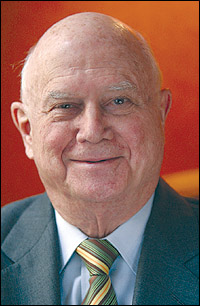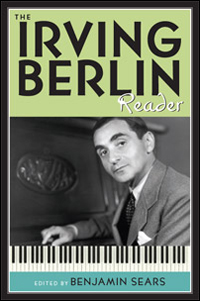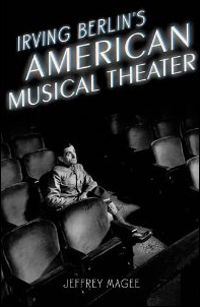
*
There's no business like show business, as the song goes, and we get a fascinating discussion of that particular field in Gerald Schoenfeld's Mr. Broadway: The Inside Story of the Shuberts, the Shows, and the Stars [Applause]. Now, people looking solely for stories of shows and stars might be less than overwhelmed by what's here. Shubert theatres housed more than half of the important plays and musicals since 1949, when Schoenfeld first stepped into the law office of William Klein. (Klein had been a permanent Shubert fixture since the evening in 1905 when he and Sam Shubert were in a train crash near Harrisburg, taking the latter's life). The shows which Schoenfeld discusses, though, are not the great hits booked into the theatres during his 60 years of service but the ones that he and Bernie Jacobs personally coproduced under the Shubert Organization mantel. A worthy subgroup, starting with Amadeus, The Life and Adventures of Nicholas Nickleby and Cats, but not the sort of titles you'd get in a memoir by Hal Prince or David Merrick. (Schoenfeld does talk at length about two unsuccessful shows he poured his heart — and Shubert resources — into, the musicals Amour and Passing Strange.)
Neither are the stars the thing. Hugh Jackman provides a loving foreword — he seemed to look upon Gerry as a father figure — and there's an introduction from Alec Baldwin as well. Schoenfeld describes his battles with Liza with a Z — The Act is one of those disastrous Shubert-produced musicals — Al Pacino, Kathleen Turner and others.
Also on hand are folks like Bennett, Fosse and Nunn. His big chapter on leading ladies, is called "Dancing with Divas: Mae, Maria and Joan," and I defy any Broadway-watcher to identify 'em without lots of head-scratching.
 |
||
| Gerald Schoenfeld |
If this sounds like a delectable roller coaster of a saga, it is. And let us be clear that Schoenfeld is not simply concerned with praising Schoenfeld. Time and again he criticizes his own decisions, blaming himself for at least some of the problems with the government's anti-trust case and noting that he, himself, urged the board to make the near-fatal appointments of Lawrence Shubert Lawrence and Irving Goldman. Anyone interested in show business of the Broadway variety — with the emphasis on business as opposed to glittery stars — is going to find "Mr. Broadway" of page-turning interest.
Passionate about theatre books? See what the Playbill Store has on its shelves.
 |
||
| Cover art for "The Irving Berlin Reader" |
The early accounts from journalists and collaborators are the best, as these poor souls were unaware that they were writing about a legendary icon. There are numerous sections pulled from autobiographies by equally legendary peers and coworkers (Rodgers, Astaire, Merman and more) plus some newer analyses. A typical comment unearthed by Sears: "it's easier to be Larry Hart or Cole Porter than Irving Berlin." The sentiment might seem oblique — this was Jule Styne talking, after all — but it is right on the mark.
Irving was a private man, certainly, by nature and prerogative. "The Irving Berlin Reader" doesn't assault and attack him, as one of his major biographers did. It just gives us several shades of Irving, and a sense of who he was behind the self-imposed public mask, at least in the early years.
*
 |
||
| Cover art for "Irving Berlin's American Musical Theater" |
I next turned to his discussion of Miss Liberty, the 1949 musical that was so surefire that Berlin, his librettist, and his director decided to produce it themselves. Why share all those profits with a producer? The show was a top-heavy clunker, the dire reception suggesting that the great American public was soon to place the long-uncontested king of pop music out to pasture. Only I couldn't find a discussion of Miss Liberty; none at all. Magee obviously knows it exists — he includes one of its songs in a list of Berlin's contrapuntal duets — but the fifth of Berlin's seven major musicals is simply skipped. Magee does, however, give us four full pages about a proposed revue that never seems to have gotten beyond a memo of ideas.
It is best to reserve judgment of "Irving Berlin's American Musical Theater" until I have had time for a full reading, but while reviewing the first Berlin book I thought it proper to try to include the second. Maybe I just happened on the wrong 20 pages in my browsing; but that's what I read, and that's what I thought.
(Steven Suskin is author of the recently released updated and expanded Fourth Edition of "Show Tunes" as well as "The Sound of Broadway Music: A Book of Orchestrators and Orchestrations," now available in paperback, "Second Act Trouble" and the "Opening Night on Broadway" books. He also pens Playbill.com's On the Record and DVD Shelf columns. He can be reached at [email protected].)
*
Passionate about theatre books? See what the Playbill Store has on its shelves.










